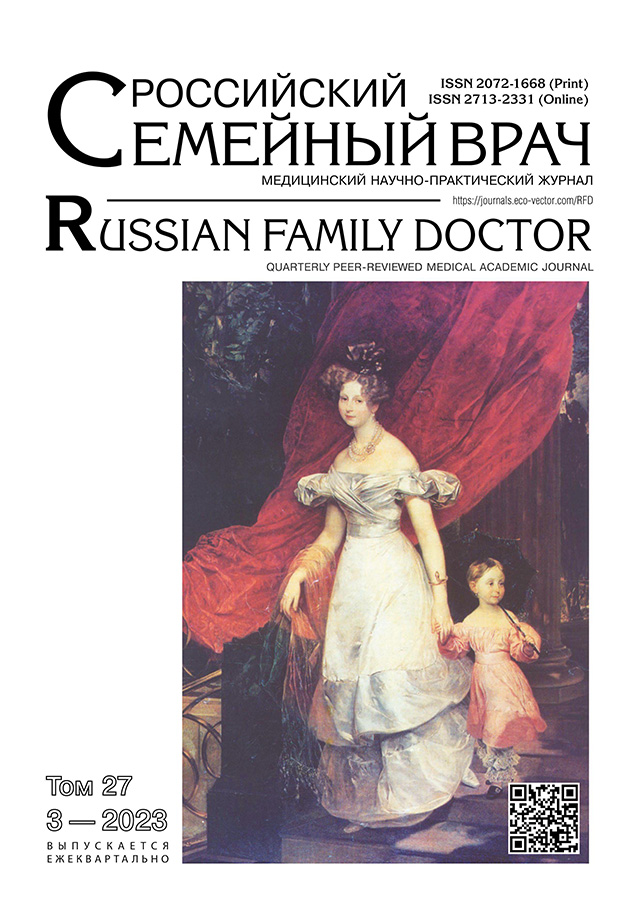Analysis of the controlled essential hypertension’s pharmacotherapy in general practice
- Authors: Slobodyanyuk A.L.1, Kupaev V.I.1
-
Affiliations:
- Samara State Medical University
- Issue: Vol 27, No 3 (2023)
- Pages: 13-21
- Section: Original study article
- Submitted: 26.05.2023
- Accepted: 18.07.2023
- Published: 08.11.2023
- URL: https://journals.eco-vector.com/RFD/article/view/456845
- DOI: https://doi.org/10.17816/RFD456845
- ID: 456845
Cite item
Abstract
BACKGROUND: Arterial hypertension is a common cardiovascular disease that requires constant monitoring by a doctor of drug therapy to achieve the target blood pressure level.
AIM: To analyze pharmacotherapy of essential hypertension in patients, who have achieved a controlled course of the disease.
MATERIALS AND METHODS: In this study 274 patients with controlled course of stage 2 arterial hypertension and no comorbidities were recruited. Blood pressure indicators, anthropometric data, results of laboratory and instrumental studies, the volume of drug therapy for hypertension were analyzed.
RESULTS: We analyzed 543 drug prescriptions for 274 patients with stage II hypertension. In 97 (35.3%) patients only one drug was prescribed, in 112 (40.7%) — two drugs, in 46 (16.7%) — three drugs from various pharmacological groups, among which monodrugs were in the lead: angiotensin-converting-enzyme inhibitors — 31.86%, cardioselective β-blockers — 23%, angiotensin 2 receptor blockers — 9.3%. Combined drugs were present in 18.4% of general doctors’ prescriptions. Fixed forms of combined antihypertensive drugs were taken by only 50 (18.4%) patients. To prevent cardiovascular complications of arterial hypertension, 75 (26%) patients were prescribed statins (atorvastatin or rosuvastatin) and 56 (19.5%) — antiplatelet monotherapy with Cardiomagnyl, Thrombo ACC or clopidogrel.
CONCLUSIONS: To achieve the target blood pressure level and control arterial hypertension in patients with stage II hypertension, general practitioners used all main
Full Text
About the authors
Anatolii L. Slobodyanyuk
Samara State Medical University
Email: a.l.slododjanjuk@samsmu.ru
ORCID iD: 0000-0002-2712-4199
md, cand. sci. (med.), assistant professor
Russian Federation, 89 Chapaevskaya St., Samara, 443099Vitalii I. Kupaev
Samara State Medical University
Author for correspondence.
Email: v.i.kupaev@samsmu.ru
ORCID iD: 0000-0003-2639-0003
md, dr. sci. (med), professor
Russian Federation, 89 Chapaevskaya St., Samara, 443099References
- Piepoli MF, Hoes AW, Agewall S, et al. 2016 European Guidelines on cardiovascular disease prevention in clinical practice Eur Heart J. 2016;37(29):2315–2381. doi: 10.1093/eurheartj/ehw106
- Oparil S, Acelajado MC, Bakris GL, et al. Hypertension. Nat Rev Dis Primers. 2018;4:18014. doi: 10.1038/nrdp.2018.14
- Oschepkova EV. Five-year results of realization of federal target program “Prevention and treatment of arterial hypertension in Russian Federation” (2002-2006). Therapeutic Archives. 2007;79(9):25–30. (In Russ.)
- Evstifeeva SE, Gridnev VI, Oschepkova EV. 4-th School for doctors of AH register. Evaluation of treatment and prevention among patients with arterial hypertension in primary care unit (data from hypertension register). Atmosphere. Cardiologiya. 2007;4:18–20. (In Russ.)
- Estruch R, Ros E, Salas-Salvado J, et al. Primary prevention of cardiovascular disease with a Mediterranean diet. N Engl J Med. 2013;368(14):1279–1290. doi: 10.1056/NEJMoa1200303
- Rossi A, Dikareva A, Bacon SL, Daskalopoulou SS. The impact of physical activity on mortality in patients with high blood pressure: a systematic review. J Hypertens. 2012;30(7):1277–1288. doi: 10.1097/HJH.0b013e3283544669
- Lim SS, Vos T, Flaxman AD, et al. A comparative risk assessment of burden of disease and injury attributable to 67 risk factors and risk factor clusters in 21 regions, 1990–2010: a systematic analysis for the Global Burden of Disease Study 2010. Lancet. 2012;380(9859):2224–2260. doi: 10.1016/S0140-6736(12)61766-8
- Chazova IE, Zhernakova YuV. Diagnosis and treatment of arterial hypertension. Guidelines. Systemic Hypertension. 2019;16(1):6–31. (In Russ.) doi: 10.26442/2075082X.2019.1.190179
- Wald DS, Law M, Morris JK, et al. Combination therapy versus monotherapy in reducing blood pressure: meta-analysis on 11,000 participants from 42 trials. Am J Med. 2009;122(3):290–300. doi: 10.1016/j.amjmed.2008.09.038
- Kim S, Shin DW, Yun JM, et al. Medication adherence and the risk of cardiovascular mortality and hospitalization among patients with newly prescribed antihypertensive medications. Hypertension. 2016;67(3):506–512. doi: 10.1161/HYPERTENSIONAHA.115.06731
- Trukhan DI, Davydov EL. Angiotensin receptor blockers II in the treatment of arterial hypertension in patients with comorbid pathology: the possibilities of candesartan. Consilium Medicum. 2017;19(10):25–32. (In Russ.) doi: 10.26442/2075-1753_19.10.25-32
- Clinical practice guidelines for chronic heart failure. Russian Journal of Cardiology. 2020;25(11):4083. (In Russ.) doi: 10.15829/1560-4071-2020-4083
- Clinical practice guidelines for stable coronary artery disease. Russian Journal of Cardiology. 2020;25(11):4076. (In Russ.) doi: 10.15829/1560-4071-2020-4076
- Clinical recommendations. Chronic kidney disease (CKD). Nephrology (Saint Petersburg). 2021;25(5):10–82. (In Russ.)
- ESC guidelines on diabetes, pre-diabetes, and cardiovascular diseases developed in collaboration with the EASD Russian Journal of Cardiology. 2020;25(4):101–161. (In Russ.) doi: 10.15829/1560-4071-2020-3839
- Glezer MG. Evaluation of antihypertensive efficacy and patient adherence to treatment with the new formulation perindopril arginine (orally disintegrating tablet) in general clinical practice: OPTIMUM program. Kardiologiia. 2016;56(4):36–41. (In Russ.) doi: 10.18565/cardio.2016.4.36-41
- Kryuchkova ON, Itskova EA, Lutay YuA, et al. Achievement of arterial hypertension control via application of perindopril arginine and amlodipine combination. Russian Journal of Cardiology. 2015;128(12):102–106. (In Russ.) doi: 10.15829/1560-4071-2015-12-102-106
- Nebieridze DV. Topical issues of beta-blockers use in various clinical situations. Medical Council. 2018;(12):12–17. (In Russ.) doi: 10.21518/2079-701X-2018-12-12-17
Supplementary files









